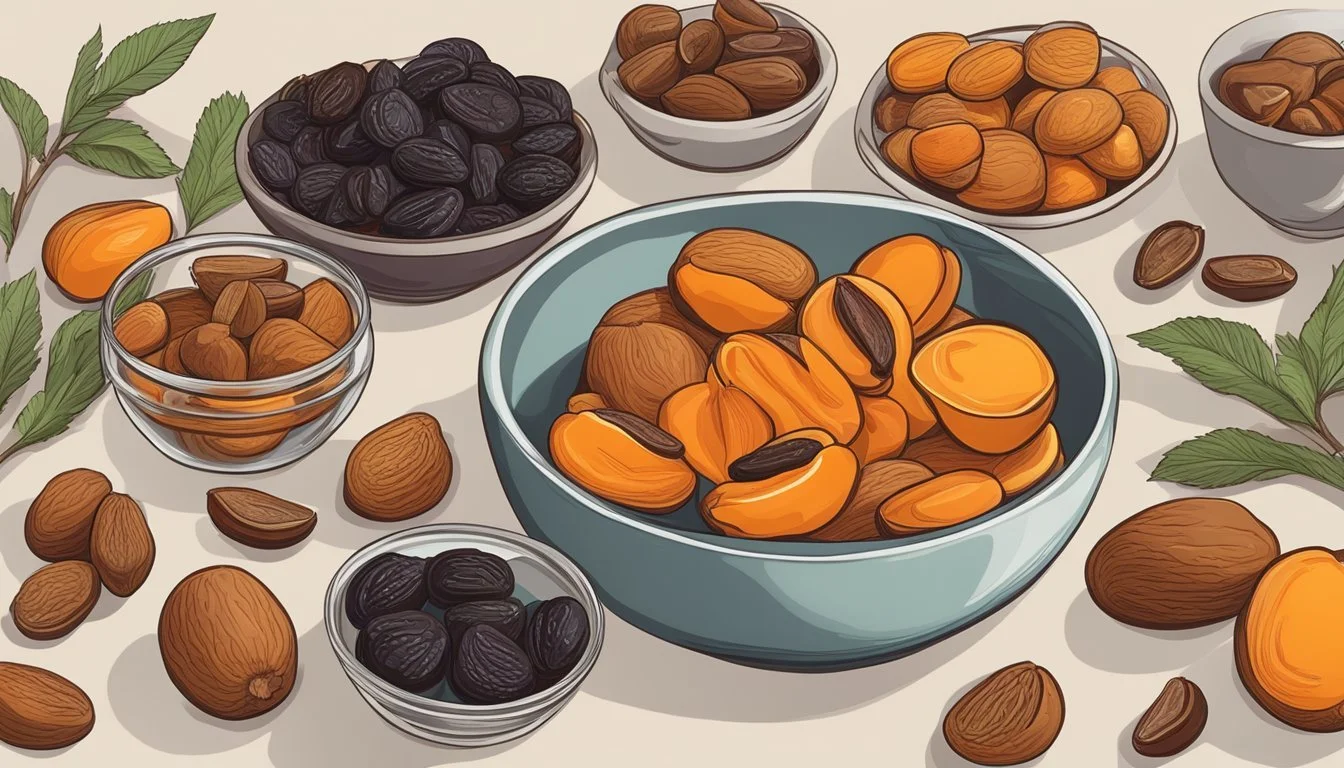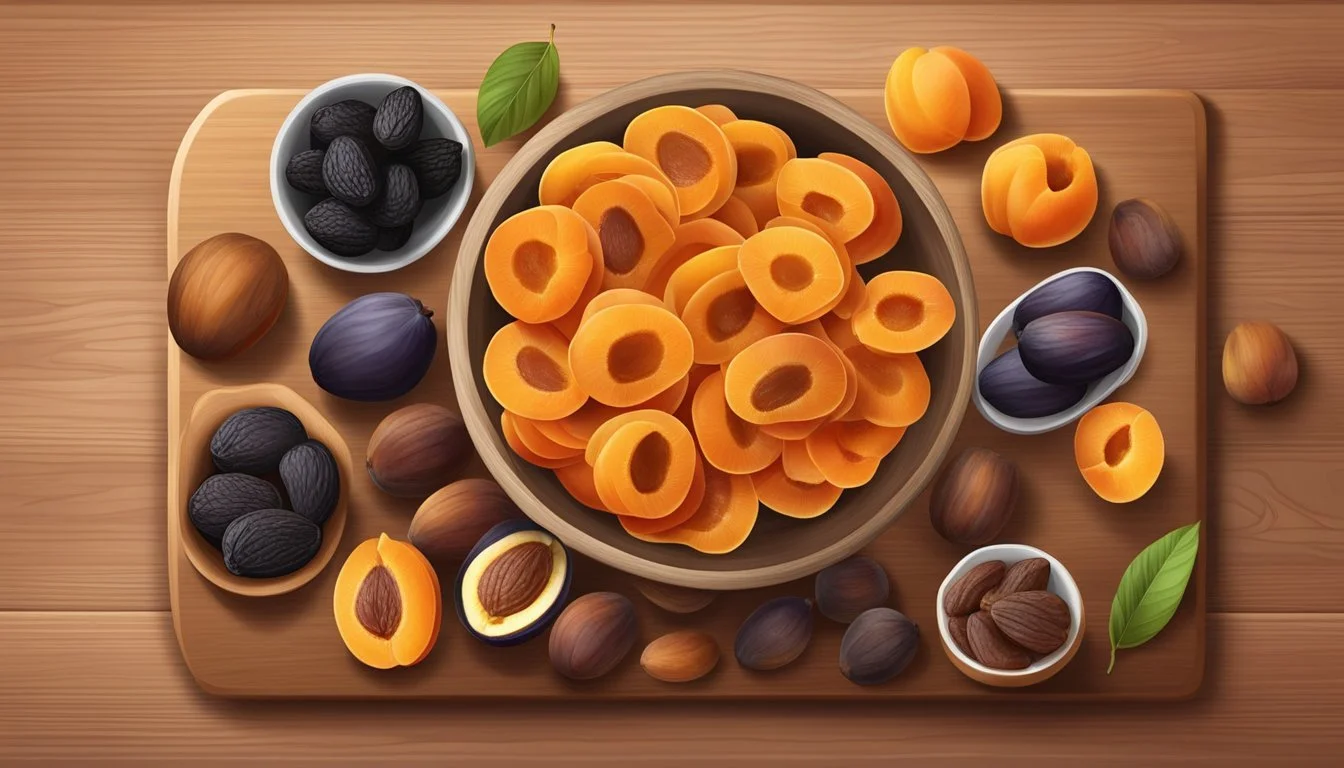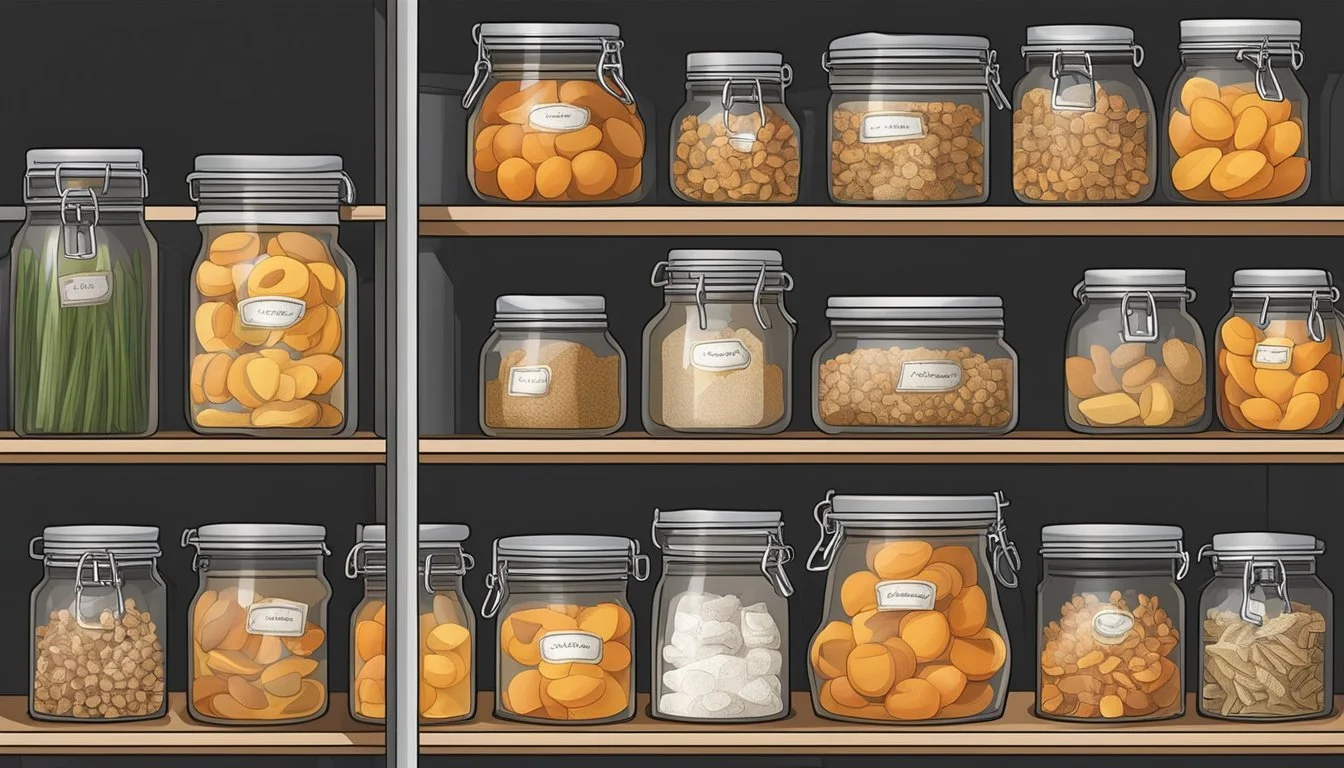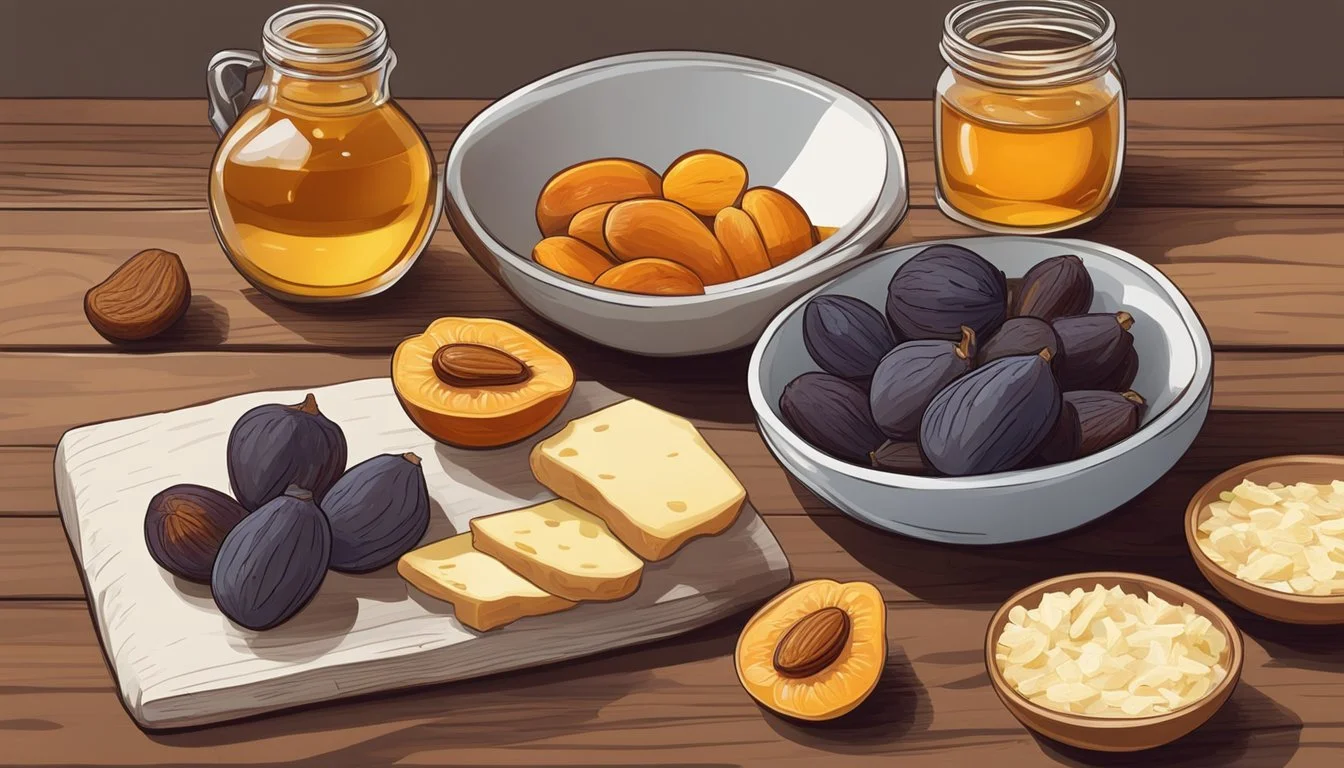Dried Apricot Substitutes
Top Alternatives for Your Recipes
Dried apricots are cherished for their sweet taste, chewy texture, and health benefits, often included in a variety of culinary applications from baked goods to savory dishes. They are packed with nutrients, including fiber, vitamins, and minerals, making them a smart choice for a healthy diet. However, there are times when dried apricots are not available, or a different flavor profile is desired in a recipe, necessitating a suitable substitute.
When looking for alternatives, it is important to consider the qualities that dried apricots bring to a dish. Their natural sweetness and tangy flavor can be closely matched by several other dried fruits (What wine goes well with fruits?). Dried figs, for instance, can serve as an excellent substitution due to a similar texture and a sweet flavor that complements many apricot recipes. Moreover, they are a good source of dietary fiber, calcium, and potassium.
For a more tropical twist, pineapple adds a unique sweet and tangy dimension that pairs well with ingredients that would typically accompany apricots. It's rich in vitamins and contains bromelain, an enzyme known for aiding digestion. Additionally, other stone fruits like peaches can be used, offering a similar flavor and juiciness that work well as an alternative for dried apricots in various preparations.
Understanding Apricots
Before selecting a substitute for dried apricots, one should appreciate their nutritional benefits, distinct flavor profile, and versatility in cooking. These attributes make them a cherished ingredient in culinary practices around the world.
Nutritional Value
Apricots are a potent source of nutrients, offering a range of essential vitamins and minerals. They are particularly rich in vitamin A, which is crucial for eye health, and antioxidants, which help protect the body from oxidative stress. The fruit also provides a good amount of fiber, aiding in digestive health.
Vitamins and Minerals in Apricots:
Vitamin A
Antioxidants
Fiber
Flavor Profile
The appeal of apricots lies in their unique sweet and tart flavor, which is enjoyed whether the fruit is fresh or dried. This complexity allows apricots to be a flexible ingredient, complementing various ingredients and dishes.
Taste Qualities of Apricots:
Sweetness
Slight tartness
Common Uses in Cooking
Apricots, both dried and fresh, are a common sight in multiple culinary applications. They are a staple in baking and cooking, often found in desserts like tarts and crumbles. Additionally, they are popularly used to make jams and preserves, where their sweet yet tart flavor can be fully appreciated.
Cooking Applications:
Baking (tarts, crumbles)
Cooking
Dessert preparations
Jams and preserves
Choosing a Substitute
When someone looks to replace dried apricots in a recipe, they must consider how the substitute will affect the final dish in terms of flavor and texture. Achieving a suitable balance ensures the dish remains delicious and as close to the intended result as possible.
Factors to Consider
The primary factors in choosing a substitute for dried apricots include maintaining a balance of sweetness and tartness, how the substitute will behave under heat in baking or cooking, and the nutritional content, which might be crucial for diet-specific requirements. A 1:1 substitution ratio is usually sought to make the switch easier.
Texture Matching
The texture of dried apricots is somewhat chewy and dense, which impacts mouthfeel and moisture content in recipes:
Dried Figs: Similarly chewy, adding a notable thickness to pastries.
Peaches: When dried, they offer a comparable succulence to apricots, useful in various baking applications.
For those seeking textural similarity in cooking, these alternatives often work well as a 1:1 substitute.
Flavor Complements
A substitute's flavor profile should complement or closely match the sweet, yet slightly tangy, taste of dried apricots:
Dried Figs: Introduce a sweet, nutty flavor suitable for both sweet and savory dishes.
Pineapple: Offers a sweet and tangy profile that brightens up dishes, though it is more acidic.
Peach Puree: Provides a mild, sweet flavor fitting for desserts, especially when a softer texture is desired.
Apricot Jam: While sweeter, it can replace dried apricots in recipes requiring a spreadable consistency.
Choosing a flavor complement depends on whether the dish is sweet or savory, and how pronounced the fruit flavor is intended to be.
Fruit-Based Substitutes
When seeking alternatives to dried apricots in recipes, one can consider various fruit-based options that provide similar sweet taste and texture. These substitutes range from fresh and dried fruits to canned varieties, each bringing its unique flavors to dishes.
Fresh Fruit Alternatives
For recipes that benefit from the texture and freshness of apricots, fresh peaches and nectarines are excellent substitutions. They're often easy to find and can be chopped or sliced to match the desired consistency in cooked dishes, sauces, and glazes. Additionally, mangoes can add a tropical twist with their vibrant sweetness and succulence.
Fresh Apricots: Closest in flavor and taste; use in the same quantity as dried.
Peaches: Sweet and juicy; a little less tart than apricots.
Nectarines: Similar to peaches but with a smoother skin.
Plums: Offer a slightly tangy flavor; best used when cooked.
Dried Fruit Options
In cases where the chewy texture of dried apricots is integral, other dried fruits like dates, prunes, and figs serve well as replacements. These options also provide a rich source of fiber and nutrients, much like dried apricots.
Dried Figs: Have a honey-like sweetness and a similar texture to dried apricots.
Prunes: Less sweet but offer a deep flavor reminiscent of apricots when used in baking.
Dates: Extremely sweet; should be used sparingly to avoid overpowering the dish.
Canned Fruit Solutions
Canned fruits can be an alternative when fresh or dried options are unavailable. Canned peaches and pears in natural juice, not syrup, are preferable to avoid excess sweetness. They can be diced and incorporated into dishes where apricots are typically used, such as condiments and sauces.
Canned Peaches: Drain well and use as a substitute in sauces and glazes.
Canned Pears: A milder option; add a subtle, sweet flavor to various dishes.
Canned Pineapple: Can impart a tropical tanginess; works well in savory and sweet recipes.
Other Sweetener Substitutes
While dried apricots add sweetness and texture to dishes, various syrups, nectars, and artificial sweeteners can be used as alternatives to achieve similar flavor profiles in recipes.
Syrups and Nectars
Honey: Honey offers natural sweetness and can be used in a variety of dishes, ranging from baked goods to glazes.
Maple Syrup: Maple syrup provides a distinctive, caramel-like sweetness that is ideal for pancakes, waffles, and some baking recipes.
Agave Nectar: Similar to honey, agave nectar is sweeter and has a thinner consistency, making it suitable for sweetening beverages and dressings.
Jams and Preserves
Apricot Jam: It is a direct substitute for dried apricots, delivering the fruit's essence and a jammy texture.
Orange Marmalade: With its citrus edge, orange marmalade can replace apricot in recipes requiring a slight tartness.
Peach Preserves: These preserves offer a sweetness comparable to apricots and work well in desserts and spread over pastries.
Apple Jelly: A milder sweetener with a transparent color and a smooth consistency, suitable for subtly sweet dishes.
Artificial Sweeteners
Artificial sweeteners provide a sugar-free alternative to natural sweeteners. They are far sweeter than sugar, thus requiring much less quantity to achieve similar sweetness levels. However, they might lack the depth of flavor that natural sweeteners bring to a dish.
Stevia: A plant-based sweetener with no calories, suitable for both cold and hot dishes.
Sucralose: It doesn't break down under heat, making it a versatile choice for baked goods and hot beverages.
Homemade Apricot Alternatives
When fresh or dried apricots are unavailable, a cook can still create delicious sauces, glazes, and pie fillings with suitable homemade substitutes. Here are a few alternatives with comparable sweetness and texture:
Peaches and Nectarines: These stone fruits offer a similar taste profile and can be easily dried at home. They make excellent substitutes in tarts and jams.
To dry at home: Slice peaches or nectarines, place on a baking sheet, and dehydrate in an oven at a low temperature until chewy.
Dried Figs: Known for their sweetness and fiber content, figs can be chopped and used in recipes requiring dried apricots.
Preparation tip: For glazes or sauces, one might puree dried figs to achieve a smoother consistency.
Pineapple: Although tropical in flavor, pineapple can bring a desirable tanginess to dishes.
Ingredient note: Fresh pineapple can be dried or used fresh in recipes for a zesty twist.
Apricot Preserves: In recipes where texture is not paramount, apricot preserves can offer the apricot flavor without the fruit's firmness.
Usage: Ideal for spreading onto pastries or as a base for apricot-flavored sauces.
Homemade Dried Apricot Paste:
Ingredients: Apricot juice or concentrate, sugar (optional), pectin or agar (for thickening).
Instructions: Combine ingredients, simmer until thickened, and then cool.
Applications: A versatile addition to desserts, particularly as a filling.
These substitutes not only replicate the flavor and texture required but are also ingredients that one might already have in their pantry, allowing continuous culinary exploration even when apricots are not on hand.
Non-Fruit Substitutes
When one is seeking alternatives to dried apricots that do not involve fruit, several pantry staples can be considered. These non-fruit substitutes offer a diverse range of textures and flavors that can complement various dishes.
Flavorings: Extracts and essences can impart a fruity undertone similar to apricots. A careful selection of vanilla or almond extract adds a subtle depth to desserts.
Sauces and Glazes: To achieve a balance of sweetness with a hint of tang, one can explore various sauces. A caramel sauce can provide a rich, sweet depth to dishes, while honey lends natural sweetness. For a tangy edge, lemon juice can be added in moderation to these sauces.
Condiments: Apricot's tartness can be mimicked with a blend of lemon juice and other condiments. Lemon zest or a small amount of distilled vinegar can add the desired sharp note to a recipe.
In applications where a sticky consistency is important, as with a glaze, one might consider using corn syrup or a light syrup made from sugar.
Substitute Notes Vanilla Extract Adds a sweet, aromatic flavor Almond Extract Imparts a nutty, fruity note similar to stone fruits Caramel Sauce Rich and sweet, adds depth Lemon Juice Adds tartness to balance sweetness Honey Natural sweetness with a distinct flavor Corn Syrup Provides stickiness and mild sweetness
These non-fruit options are versatile and can be adjusted to suit the desired taste and texture of a dish, making them confident counterparts to the traditional dried apricot.
Specialty Substitutes
In the realm of dried apricots, specialty substitutes offer unique flavors and textures to culinary enthusiasts. These alternatives are not only innovative but also cater to a range of ethnic cuisines.
Culinary Innovations
Within innovative cuisine, chefs often seek distinctive ingredients that impart nuanced flavors. Two hybrids, apriums and pluots, are noteworthy in this category. Apriums lean more towards the apricot in taste and texture, while pluots are a little plumper and have a sweeter flavor, combining the best aspects of plums and apricots.
Apriums: A finer substitute for dried apricots when seeking a similar but subtly different flavor profile.
Pluots: Offers a balance between the tartness of an apricot and the sweetness of a plum, lending a unique taste to dishes.
Ethnic and Exotic Substitutes
For those exploring ethnic and exotic alternatives, the fruit spectrum is broad. Nectarines provide a similar stone-fruit quality with a slightly different flavor and can be dried as a direct substitute. Meanwhile, mango and persimmon puree introduce tropical and Asian twists to recipes.
Substitutes Characteristics Culinary Uses Nectarine Familiar texture, less tangy than apricots Can be diced or pureed Mango Sweet, tropical flavor; vibrant color Excellent in chutneys Persimmon Puree Sweet with a honey-like taste; smooth texture Substitute in baking, sauces
Mango puree in particular is an excellent alternative, offering a sweet and creamy consistency that works well in desserts and baked goods. Its flavor is distinct yet can complement many of the same recipes as dried apricots.
Nutritional and Health Considerations
When selecting substitutes for dried apricots, it's crucial to consider their nutritional profiles and health benefits. Dried apricots are revered for being a nutrient-dense snack, providing a rich source of dietary fiber, antioxidants, potassium, and vitamins, particularly vitamin A and iron.
Fiber: Substitutes such as dried figs are comparable in their fiber content. Sufficient dietary fiber helps maintain digestion and regular bowel movements.
Antioxidants: Dried apricots contain antioxidants that are essential in protecting the body from oxidative stress. Substitutes like prunes and golden raisins also offer antioxidants, although the types and quantities may vary.
Potassium: This mineral is vital for heart health and maintaining normal blood pressure. Dried apricots are an excellent source of potassium, and substitutes such as dates match this benefit.
Eye Health: Vitamin A plays a crucial role in maintaining healthy vision. Dried apricots are high in Vitamin A, and its substitutes should ideally contain this vitamin to support eye health.
Digestion: The fiber in dried apricots as well as in its substitutes like prunes aids digestion. Additionally, pineapple contains bromelain, an enzyme that promotes digestion.
Vitamins A and Iron: These nutrients are important for immune function and oxygen transport in the blood, respectively. Look for substitutes that offer these vitamins to ensure a nutritional balance.
Nutrient Benefit Fiber Aids in digestion and heart health Antioxidants Protects cells from oxidative damage Potassium Essential for heart and muscle functions Vitamin A Important for vision and immune health Iron Critical for blood production and energy
Substitutes for dried apricots should be chosen based on their ability to offer similar nutritional value, enabling individuals to meet their health and dietary needs.
Using Substitutes in Recipes
When opting for substitutes in recipes, one must consider the equivalents in measurement and the potential impact on flavor and texture. It's crucial to adapt the recipe to ensure successful results when cooking or baking.
Adjusting Measurements
Substitutes for dried apricots should be used in equivalent quantities to achieve the desired consistency. Given below is a basic guideline for substitution measurements.
Fresh Apricots: 1 pound equals 2 1/2 to 3 cups sliced
Dried Figs: Use an equal weight as that of dried apricots
Dried Cranberries: Equal weight can be used, but tartness may alter the flavor profile
Dates: Use equal weight, though they are sweeter and might require reducing added sugars
Apricot Jam: Use by volume equivalent to chopped dried apricots
Pineapple: Match the weight; however, consider the extra moisture
One should make adjustments for sweeter or tarter substitutes by reducing or increasing the amount of sugar and other flavoring agents in the recipe.
Cooking and Baking Tips
When using substitution in cooking, it's important to consider the moisture content and cooking time.
If a recipe calls for dried apricots and fresh apricots are being used, they should be cooked for a shorter duration to prevent disintegration due to their higher moisture content.
With dried figs or dates, they should be chopped to a size comparable to dried apricots to maintain a consistent texture.
Apricot jams or preserves can be used in sauces, glazes, or spreads where a smoother texture is desired.
In baking, the substitutions can affect the moisture balance. Dried substitutes are generally preferable to maintain the intended texture. When using a wetter ingredient like pineapple or jam, one may need to adjust other liquid amounts in the recipe.
Taste Testing
Substitutes will impart different flavors to the dish, and taste testing becomes a critical step.
Dried figs add a nutty flavor and are less tangy than apricots.
Dates can introduce a rich, caramel-like sweetness.
Dried cranberries offer an acidic contrast that might complement certain recipes.
Pineapple provides a tropical zest.
It is advisable to taste and adjust seasonings accordingly to balance the final dish's flavor, keeping in mind the sweetness or tartness brought by the substitute.
Storage and Preservation
When considering the storage of dried apricots and their substitutes, it is crucial to understand their varying requirements to maintain freshness and flavor. Dried apricots typically have a shelf life ranging from 6 to 12 months in the pantry at room temperature. The ideal temperature range is between 50-70°F (10-21°C).
Canned apricots, another substitute, should be stored in a cool pantry and, once opened, transferred to the refrigerator where they maintain a thick consistency and remain edible for up to 5 days.
For a longer-term option, dried apricots and canned substitutes can be frozen where they may last 12 to 18 months. Ensure they're sealed in airtight containers or freezer bags to prevent freezer burn.
If one incorporates apricots or their substitutes into a fruit salad, it's best to consume the dish within 48 hours as the fruits release juices that can alter texture and flavor.
Here’s a concise table for a quick reference:
Substitute Pantry (Room Temp) Fridge After Opening Freezer (Airtight Container) Dried Apricots 6-12 months Not applicable 12-18 months Canned Apricots Until expiration date 3-5 days Not recommended Apricots in Fruit Salad Not recommended 1-2 days Not recommended
In all cases, it's important to check for signs of spoilage such as changes in color, texture, or smell before using any preserved fruit. Use them while they are at their peak quality to enjoy their distinct sweetness and nutritional benefits.
Pairing with Other Foods
When incorporating substitutes for dried apricots into dishes, one can consider various pairings that enhance the flavor profiles of the meals. For toast, adding a spread of peach puree can mimic the sweetness and texture of apricot jam. This combination is particularly delightful in the morning, providing a fresh and tangy start to the day.
In salads, chunks of pineapple can replace dried apricots, complementing the greens with a vibrant burst of sweetness. A salad dressing enhanced with mango puree can introduce an exotic twist, pairing well with ingredients such as feta cheese or walnuts.
For savory dishes, chefs can integrate dried figs as a substitute for dried apricots. They bring a similar chewy texture and a delightful sweetness that can complement meats and cheeses. Here, the dried figs work well in grain-based salads or as a topping on flatbreads.
Sweet dishes often benefit from the natural sugars and flavors in apricot alternatives. Mango, when used fresh or dried, provides a bold, sweet flavor that pairs well with spices like cinnamon and cardamom, making it an excellent choice for baked goods and desserts.
Desserts, such as fruit tarts or cookies, can feature peaches as an apricot substitute. The stone fruit shares a close flavor profile with apricots, offering a satisfyingly juicy and tangy taste. An almond and peach combination is particularly successful, with the nutty crunch of almonds completing the soft sweetness of the peaches.
Each substitute mentioned can be tailored to align with the desired flavor outcomes of a variety of dishes. Chefs and home cooks can confidently experiment with these alternatives to achieve the optimal taste and texture balance in their culinary creations.
Cultural Significance of Apricots
Apricots have long been more than just a fruit; they carry a wealth of cultural significance. The apricot tree itself is seen as a symbol of life and renewal. With its velvety texture and sweet taste, the apricot is often associated with luxury and abundance.
Turkey is one of the largest producers of apricots in the world. Here, apricots are deeply ingrained in the culture and cuisine, often appearing in both sweet and savory dishes. They are a staple for Turkish Ramadan feasts, symbolizing the light after a long day of fasting.
Armenia, meanwhile, considers the apricot as a national fruit. Its importance is such that the apricot's botanical name, Prunus armeniaca, hints at an Armenian origin.
The fruit’s presence is ubiquitous in traditional Armenian festivals and rituals and has become a proud emblem featured on everything from postage stamps to soccer jerseys.
The table below shares key attributes of apricots specific to Turkey and Armenia:
Country Significance Turkey Major producer; apricots have cultural and economic importance. Armenia National fruit; a symbol of heritage, displayed in various cultural emblems and celebrations.
In these cultures and beyond, the apricot’s significance transcends its culinary uses, reflecting a deep connection to historical roots and national pride. They are often seen as a bridge between generations, linking the past to the present through stories, recipes, and shared experiences.
Conclusion
Choosing a substitute for dried apricots depends largely on the intended use and personal preference. Fresh apricots can serve as a direct replacement, maintaining a similar flavor profile but with a higher moisture content. For baking and cooking, dried figs and peaches offer a complementary sweetness and texture. Figs are particularly rich in dietary fiber and provide essential nutrients such as calcium and potassium.
On the other hand, peaches deliver a succulent and less acidic taste, suitable for purees or when a milder flavor is desired. Mangoes, with their tropical sweetness, provide a unique twist and can be an excellent alternative in dishes where their distinct flavor will shine.
For those seeking a citrusy zest, pineapple stands out. Its bright taste and nutritional benefits make it a favorable option, with the added advantage of aiding digestion due to the presence of bromelain.
In addition to these fruit substitutes, preserves such as raspberry or peach offer a convenient and easily accessible option, especially in recipes where the apricot is used more for its sweetness and texture than for its specific flavor.
When replacing apricots, one should consider the moisture and sugar content to achieve the desired outcome in recipes. Effective substitution not only relies on achieving a similar taste but also on understanding the characteristics of the alternative and how it interacts with other ingredients in a given dish.











